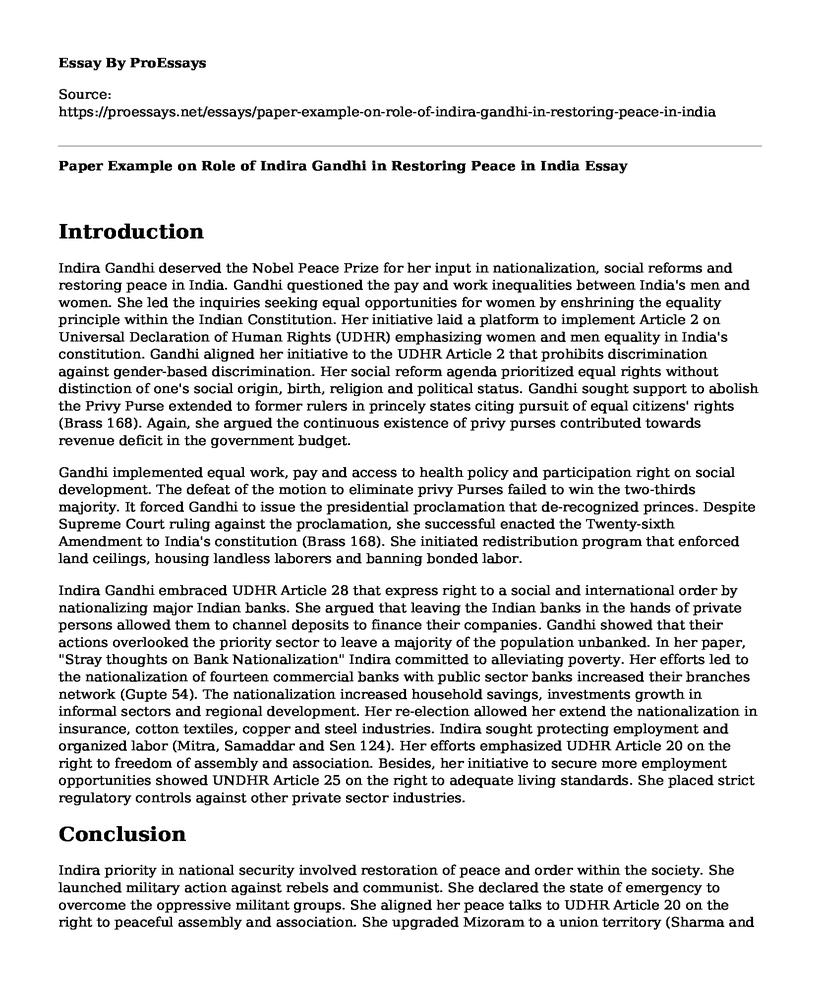Introduction
Indira Gandhi deserved the Nobel Peace Prize for her input in nationalization, social reforms and restoring peace in India. Gandhi questioned the pay and work inequalities between India's men and women. She led the inquiries seeking equal opportunities for women by enshrining the equality principle within the Indian Constitution. Her initiative laid a platform to implement Article 2 on Universal Declaration of Human Rights (UDHR) emphasizing women and men equality in India's constitution. Gandhi aligned her initiative to the UDHR Article 2 that prohibits discrimination against gender-based discrimination. Her social reform agenda prioritized equal rights without distinction of one's social origin, birth, religion and political status. Gandhi sought support to abolish the Privy Purse extended to former rulers in princely states citing pursuit of equal citizens' rights (Brass 168). Again, she argued the continuous existence of privy purses contributed towards revenue deficit in the government budget.
Gandhi implemented equal work, pay and access to health policy and participation right on social development. The defeat of the motion to eliminate privy Purses failed to win the two-thirds majority. It forced Gandhi to issue the presidential proclamation that de-recognized princes. Despite Supreme Court ruling against the proclamation, she successful enacted the Twenty-sixth Amendment to India's constitution (Brass 168). She initiated redistribution program that enforced land ceilings, housing landless laborers and banning bonded labor.
Indira Gandhi embraced UDHR Article 28 that express right to a social and international order by nationalizing major Indian banks. She argued that leaving the Indian banks in the hands of private persons allowed them to channel deposits to finance their companies. Gandhi showed that their actions overlooked the priority sector to leave a majority of the population unbanked. In her paper, "Stray thoughts on Bank Nationalization" Indira committed to alleviating poverty. Her efforts led to the nationalization of fourteen commercial banks with public sector banks increased their branches network (Gupte 54). The nationalization increased household savings, investments growth in informal sectors and regional development. Her re-election allowed her extend the nationalization in insurance, cotton textiles, copper and steel industries. Indira sought protecting employment and organized labor (Mitra, Samaddar and Sen 124). Her efforts emphasized UDHR Article 20 on the right to freedom of assembly and association. Besides, her initiative to secure more employment opportunities showed UNDHR Article 25 on the right to adequate living standards. She placed strict regulatory controls against other private sector industries.
Conclusion
Indira priority in national security involved restoration of peace and order within the society. She launched military action against rebels and communist. She declared the state of emergency to overcome the oppressive militant groups. She aligned her peace talks to UDHR Article 20 on the right to peaceful assembly and association. She upgraded Mizoram to a union territory (Sharma and Sharma 177). Her efforts involved resolving the hostility that emerged within the communities. Gandhi focused on ending the insurgency in North-East region. Backing the military response, Indira success bore the surrender of militants when they signed the Shillong Accord (Manchanda 59). Her success featured peaceful quests by eliminating ethnic conflicts guided by the right to peaceful association, assembly, national security, and assembly. Such arose in leading successful peace platform citing Indira's agreement with Shimia and Pakistan.
Works Cited
Brass, Paul R. Routledge Handbook of South Asian Politics: India, Pakistan, Bangladesh, Sri . Routledge: New York, 2010.
Gupte, Pranay. Mother India: A Political Biography of Indira Gandhi. New York : Penguin Books, 2012.
Manchanda, Rita. SAGE Series in Human Rights Audits of Peace Processes: Five-Volume Set. New Delhi : SAGE Publications, 2015.
Mitra, Iman Kumar, Ranabir Samaddar and Samita Sen. Accumulation in Post-Colonial Capitalism. Singapore : Springer, 2016.
Sharma, Suresh Kant and Usha Sharma. Discovery of North-East India: Geography, History, Cutlure, Religion, Politics, Sociology, Science, Education and Economy. New Delhi : Mittal, 2015.
Cite this page
Paper Example on Role of Indira Gandhi in Restoring Peace in India. (2022, May 22). Retrieved from https://proessays.net/essays/paper-example-on-role-of-indira-gandhi-in-restoring-peace-in-india
If you are the original author of this essay and no longer wish to have it published on the ProEssays website, please click below to request its removal:
- Sociolinguistics Essay
- "I Will Never Not Ever Eat a Tomato" by Lauren Child Essay
- Hot Coffee Documentary: Summary Paper Example
- Essay Example on Technological Advancement: Rise of Hacktivism and Cybercrime
- Essay on China's Non-Verbal Communication: Differences in Low-Contact Culture
- Essay Example on Prescription Opioids and Their Unexpected Effects: A Reality Check
- Free Paper Sample on End Racial Discrimination: Upholding Equality in the US







